
I just finished The Winter King by Christine Cohen, and really enjoyed it. I have selected it as my choice for book of the month in the hope that you will also (start and) finish it, and enjoy it as much as I did.
The book is written for kids, and the challenging aspects of darkness it contains are really handled very well. The darkness is significant, but not overpowering. The setting is a village in the north somewhere, time period unknown, and the village is ruled by corrupt leaders ruling in the name of their god, the inscrutable and tyrannical winter king. The protagonist is a young girl named Cora who, together with her mother, is laboring in a hardscrabble situation at the daunting task of keeping their family alive. Her father died in a fishing accident some years before, and so they are barely making it on the outskirts of the village in genuine poverty.
The first thing to admire about this book is how cold it makes you feel. The winter that pervades this book is a winter that actually gets down into your bones. As admirable as the one hundred years of winter in Narnia might be (and it is admirable), it never made me cold. This is just one winter in an unspecified place, and the coldness works. This winter is wintery.
More than one commenter has noted that this book is very much like Till We Have Faces by Lewis. This is really an on-point assessment. What starts out as a complaint against the gods turns out to be far more complicated than that. The gods have something to say for themselves, as it turns out. Because of the loss of her father, Cora is bitter and hates the winter king, along with all his representatives. She is strong-willed, and also courageous, and when this is coupled with her bitterness, we find her pursuing certain secrets in a foolhardy, but ultimately successful, way.
And this leads the third thing I would like to note about this book, which is how Protestant the structure of it is. This is not the story of a girl who hates the true religion, but who is then converted to it. Nor is it the story of a girl who hates a false religion, and then overthrows it. Instead this is a story of a true religion that had been encrusted with falsehoods, and which has a cabal of false priests managing it, which is then attacked by someone who believes the corruptions are the sum total of that religion. This is then followed by her discovering the truth beneath the corruptions, and in the process, Cora discovers that she had some corruptions of her own. It is a story of reformation—corporate and personal. And the story is done well.
I know that Christmas is past us. But surely you have enough kids that somebody’s birthday is coming up.

